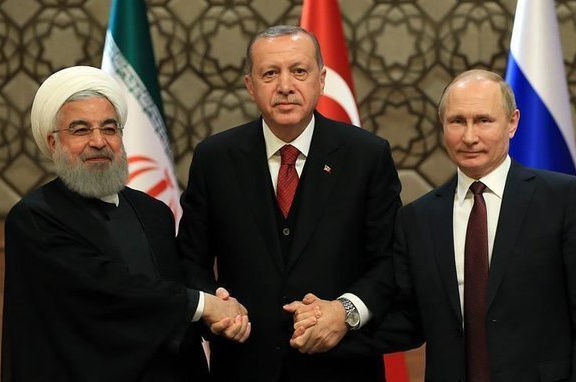Iranian President Hassan Rouhani, Turkish President Recep Tayyip Erdoğan, and Russian President Vladimir Putin, Ankara, Turkey, September 16, 2019
Turkish President Recep Tayyip Erdoğan has declared an ambitious foreign policy, seeking Ankara’s — or his — leadership in the Islamic world and the Middle East and influence in areas such as Central Asia, the Balkans, and North Africa.
But in the kaleidoscope of regional politics, and amid Turkey’s internal difficulties, is there even a coherent — let alone a successful — Turkish foreign policy?
World Unfiltered turns to leading analyst Professor İlhan Uzgel of Gazeter Duvar.
Watch all World Unfiltered Videos
World Unfiltered: Is Polarization the Next “Political Pandemic” After Populism?
3:40: Are we witnessing not only a free fall in Turkish foreign policy but also the Turkey-US relationship?
9:10: If the Pentagon had not checked Trump — preventing a full withdrawal of US troops from Syria and Iraq — would we be saying today that President Erdoğan played the Americans and succeeded?
14:00: You have written about US-Turkish relationship, “Control is in US hands”. Is that because of NATO? The American diplomatic presence? Or Turkey’s economic dependence on the US and Europe?
20:10 What is Erdoğan’s motivation for intervention among the Gulf States? Has it been counter-productive?
24:00: In Syria, has Turkey been able to extend beyond its border by balancing the US and Russia while playing the Kurdish card for military action?
27:25: Why do you see Turkey in trouble over security and competition for Eastern Mediterranean resources?
30:45: What are Turkey’s tactics over Ukraine? Is Erdoğan being assertive in foreign policy or trying to cover up for failures elsewhere?
34:45: Is Erdoğan willing to set aside his anger with US over the failed Turkish coup in 2016, for the sake of better relations now?
37:40: If the AKP government asked for your help, what’s your first recommendation for realignment or reshaping of Turkish foreign policy?

